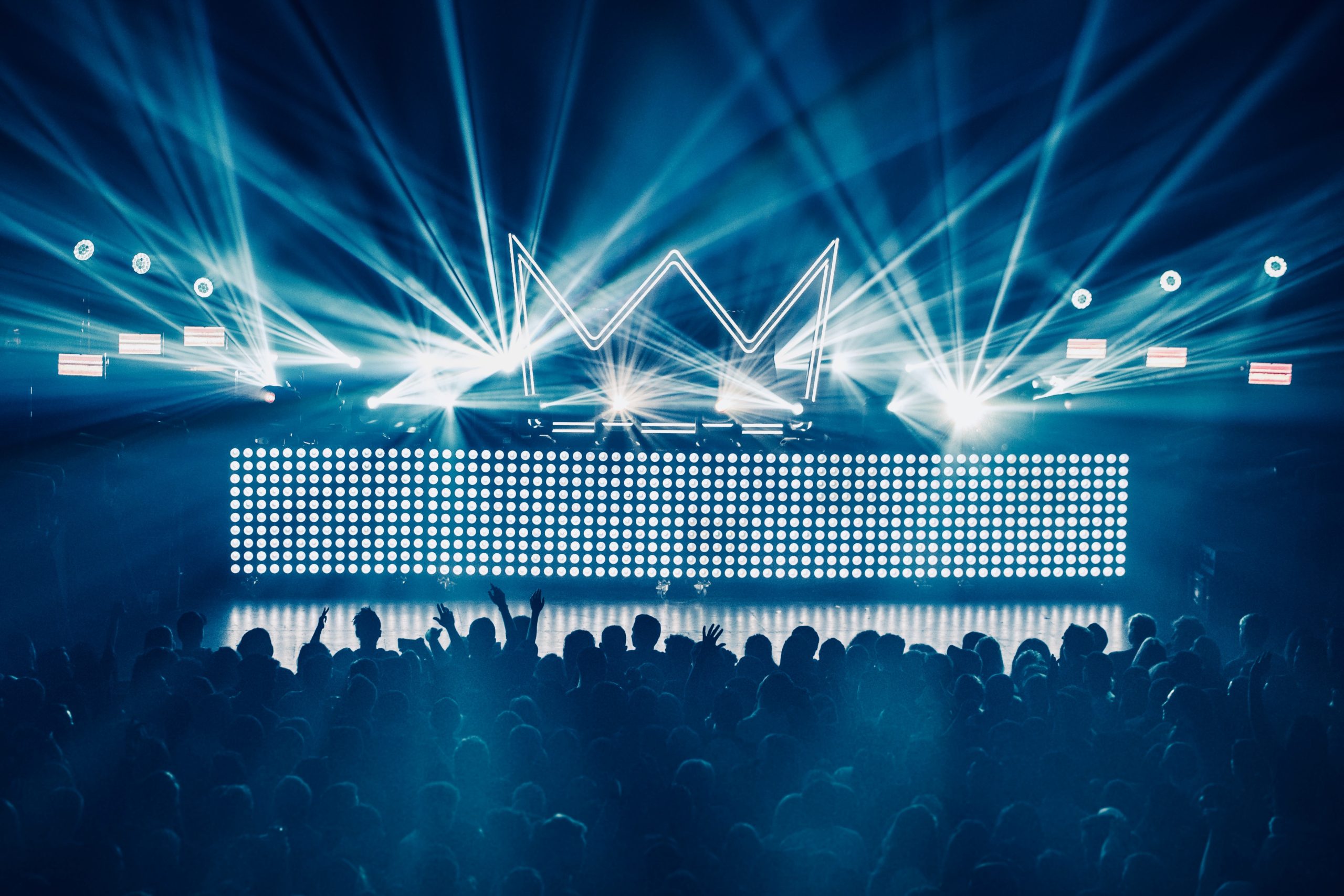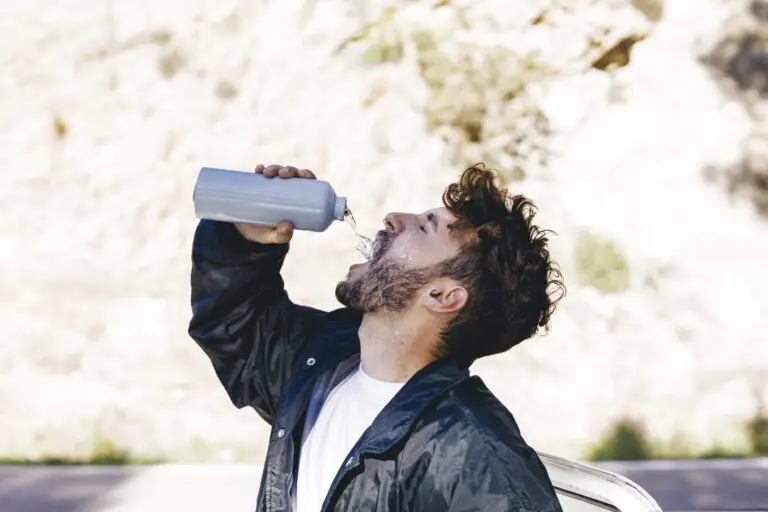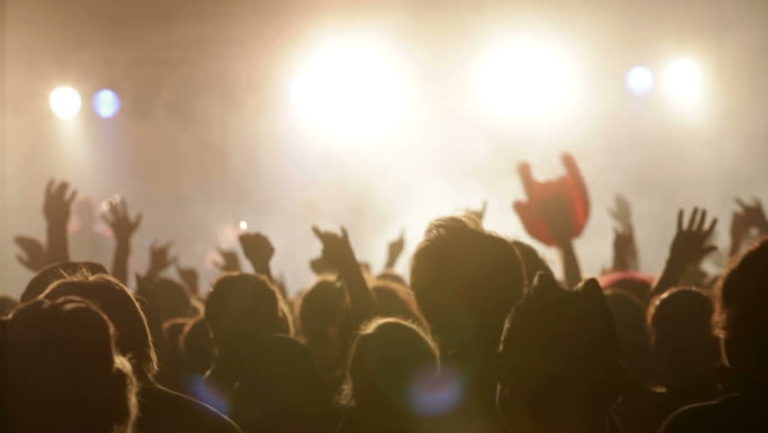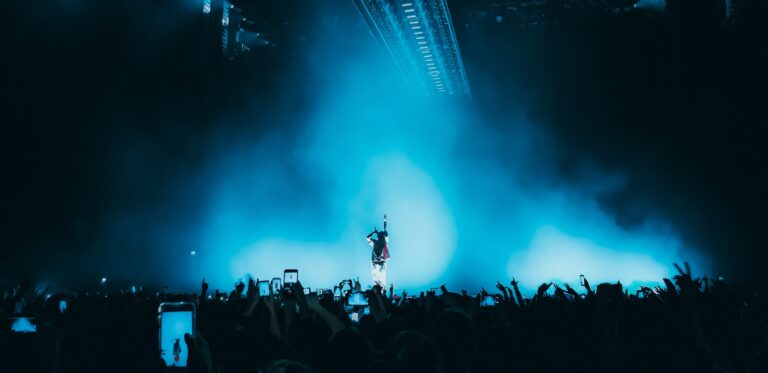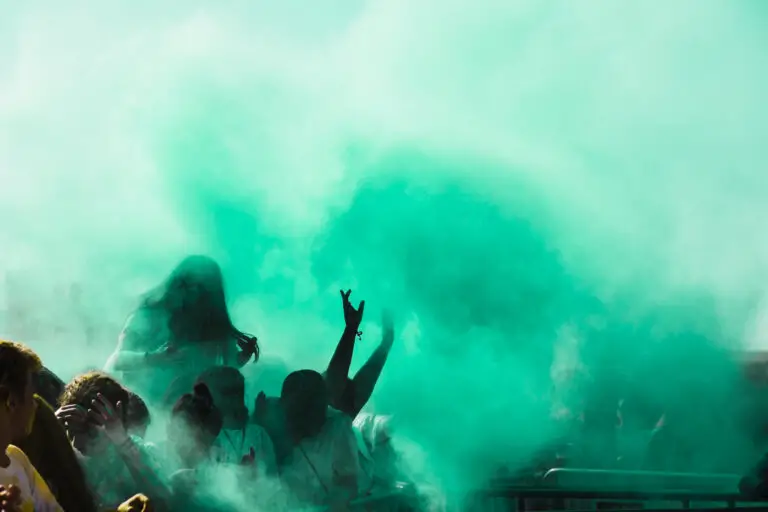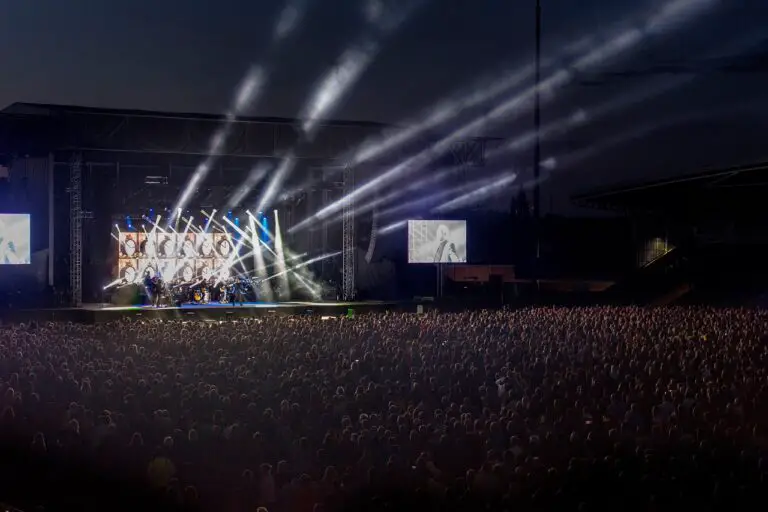Don’t Be Late: The Best Times to Arrive at a Concert
Congratulations! You’ve gotten tickets to see your favorite artist in concert, and you’re stoked. Now comes part 2: getting to where you need to be.
The question is, how early should you get to a concert? The earlier you get to your concert, the better. As a rule of thumb, arriving 2 hours before the show starts is ideal. If you have reserved seats, showing up 15 minutes before the opening act is sufficient.
Of course, we understand if certain situations prevent you from being there bright and early. We’ll go over some variables and exceptions to the 2-hour rule.
When Should You Arrive at a Concert?
If you show up for your concert at the time listed on the ticket, you will have a bad time. Usually, thousands of people have already gotten in line to flood the entrance. Arriving two hours early is a good rule of thumb for most arena concerts.
Arriving early allows you plenty of time to find a spot with a good view of the stage. Plus, you’ll have an excellent opportunity to experience other parts of the concert like getting a drink, meeting people with the same music tastes, and grabbing some apparel and souvenirs.
However, there are situations where showing up late is better. If you know you have assigned seating and it’s a small venue, you can safely wait for the crowd to die down and still get in before the music starts. This is the best option for those of us who’d instead enjoy live music for the sake of live music than to drink and socialize.
What Time Do Concerts Actually Start?
The time on your ticket likely refers to when the doors open, not when the music starts. Expect the first opening act to begin 1 hour after the time listed, and the main artist to start playing 2 hours after the ticket time.
For example, if your ticket says 7:00, you likely won’t see the fleshy visage of your favorite lead singer until 9. Of course, if it hits the two-hour mark and the main act hasn’t begun, there’s little cause for concern. The exact time of concerts can be drastically different depending on outside factors.
If you’re determined to figure this one out, research the artist you’re going to see and explore online fan forums to get an idea of how long specific musicians take to get ready.
What Time Does the Opening Act Start?
Often a less popular band will kick things off before the artist you showed up to see takes the stage. This is the opening act, comprised of talented folks whose job is to get everyone pumped up. Once you’re past the barricade, how long can you expect to wait?
The opening act usually starts an hour after the doors open (the time on your ticket). This also gives that artist an hour to play and wrap things up before the main event. Once again, assuming your ticket says 7:00, you can first expect some tunes around 8.
Keep in mind that some more prominent artists may have several bands open. There are circumstances where the first band may play 30 minutes after the doors open to give others enough time to perform. Being patient and willing to grab a drink, socialize, and keep yourself entertained until the music starts is vital for concertgoing.
Why Don’t Bands Announce Start Times?
While it seems silly that tickets list the time doors open instead of when the headlining band gets on stage, there’s a reason bands don’t announce start times. Guessed it? The answer is money.
Venues need you and your fellow fans to buy food and drinks because that’s how they keep their business afloat. If artists broadcasted the moment they planned to start, many people (myself included) would show up right around that time. This would mean fewer people are wandering around with cash in hand, waiting for the show to start.
Why Do Concerts Sometimes Start Late?
You bought your tickets, and now you’d like to see this band you love to play live. Right now. Sadly, this isn’t how things work.
But why is it that concerts take so long to start?
Firstly, because venues want your money, ticket times are generally about 2 hours early because of a well-planned process. Fans come in, but the artists seem to drag their feet. To kill time, people buy food, drinks, and merchandise. Additionally, the more time people stay for a concert; the more money people will need to pay for hourly parking.
Secondly, setting up for a concert takes a lot of work. Hauling massive loudspeakers and PA systems onto the stage often takes more time than expected. Even though concert planners work diligently to ensure set-up goes as smoothly and quickly as possible, even the most insightful ones can’t account for everything. Sometimes equipment breaks, staff gets caught in traffic, or the lead guitarist can barely walk thanks to last night’s concert.
A final reason concerts start late is because many people work late. Venues and artists know that they’ll have a much higher turnout for an 8 pm show than the noon lunch rush. Plus, folks from rural areas and suburbs must drive out of town and may need at least one hour to commute.
We dived a little deeper
If it’s 5:58 and you’re stuck in traffic to a 6 o’clock show, your first instinct may be to cry, panic, or scream in rage. You might be incredibly stressed out if this has never happened. You might not know what to expect. Should you mourn the loss of your ticket money?
Not necessarily. What happens when you’re late to a concert depends on concert size, turnout, and parking. Let’s look at a couple of situations.
Other Reasons Concerts Don’t Typically Start On Time
We’ve gathered insights from five professionals, including industry founders and a director of content, to shed light on this question. From the impact of logistical challenges to the unpredictability of concerts, discover their unique perspectives on concert timeliness.
Logistical Challenges Delay Concert Start Times
Concerts rarely start on time, based on experience. One instance of this was a concert by a popular band last year. The show was scheduled to begin at 8:00 PM, but the band did not take the stage until almost 9:30 PM.
This delay can be attributed to several factors. Logistics and technical preparations often take longer than expected. Bands have elaborate stage setups with sound systems, lighting rigs, and props that require extensive setup time.
Large crowds at these events result in long lines for security checks and ticket scanning at the entrance, which further delays the start of the concert. Artists sometimes choose to engage in pre-show rituals or warm-ups before stepping onto the stage; these activities also contribute to delays.
– Steve Dinelli, Founder, MarketerInterview.com
Venue Efficiency Influences Concert Timeliness
Concerts may start on time or have slight delays, depending on the venue’s efficiency in managing crowd control and ticket scanning procedures. Efficient venues with streamlined entry processes are more likely to start concerts promptly, ensuring a smooth and enjoyable experience for attendees.
However, venues that face challenges in managing enormous crowds or implementing ticket scanning systems may experience delays. For example, a well-organized venue with multiple entry gates, efficient ticket scanners, and effective crowd management protocols can efficiently admit attendees and start the concert on time.
A venue with limited entry points, inadequate staff, or slow ticket scanning procedures may encounter delays. It is crucial for venues to invest in efficient systems and protocols to minimize the chances of concert delays and provide a positive experience for concert-goers.
– Roy Lau, Co-Founder, 28 Mortgage
Expect Unpredictability at Concerts
With concerts, it’s best to expect the unexpected. While most concerts start on time, there are many factors that can cause delays. For example, technical difficulties can cause delays at the start of a concert.
If a concert is oversold, there may be a delay while the venue plans to accommodate the extra guests. Finally, if a concert is outdoors, the weather can be a factor in delaying the start time. All of these factors can cause concerts to start late, so it’s best to be prepared for a delay if you’re attending a concert.
– Matthew Ramirez, Co-Founder, USMLE Test Prep
What Happens if I’m Late to a Concert?
If you’re late to a smaller show and have reserved seating, you could show up 30 minutes late and not miss much. As we’ve mentioned, venues usually like to set aside an hour or so before the opening act to give people a chance to spend money on food, drinks, and merch. Worst case scenario, you won’t have much time to socialize before the show starts.
On the other hand, you may have some difficulties if you’re 30 minutes late to an arena concert. You may need to circle the lot like a hawk and wait for someone to leave early to get a decent space. Additionally, you’ll probably have to stand somewhere far from the stage.
Being late happens, but try your best to have a Plan A, B, and C in case something unexpected puts you behind. If you haven’t already thought about it, be sure to order your tickets in advance.
Do Concerts Let You In If You’re Late?
Arriving late to a concert can be a source of stress, but it’s not an uncommon occurrence. Various circumstances such as traffic delays, long lines, or a personal emergency can lead to fans arriving late to the venue. So, if you find yourself running behind schedule, what can you expect at the concert?
Policies Can Vary
It is essential to note that policies on late arrivals can vary significantly depending on the venue, the type of concert, and the artist or band performing. While many venues will allow late entry, some may have strict policies that close doors at a certain point, especially for performances such as theater shows, classical concerts, and more intimate sets.
Disruption to Other Attendees
Even if a venue allows late entry, coming in after the performance has started can be disruptive to other attendees. To minimize disruption, latecomers may be asked to wait for a suitable break in the performance to find their seats. Some venues have specific protocols in place, guiding late attendees to their seats with minimum disturbance to others.
Missing Out on the Experience
Arriving late could mean missing the supporting acts or even the main performer’s opening songs, potentially diminishing the overall experience. Furthermore, late arrival might mean having to take a less desirable spot if the concert has a general admission policy where no seats are assigned.
Tips for Late Arrivals
If you find yourself arriving late to a concert, here are a few tips that might help:
- Check the Venue’s Policy: Before you head to the concert, check the venue’s official website or contact customer service to understand their policy on late arrivals.
- Be Courteous: If you arrive late, try to enter quietly and be courteous to other attendees.
- Plan Ahead: While it may not always be possible to anticipate delays, try to plan your journey to arrive with plenty of time to spare, taking into consideration potential traffic and other delays.
- Enjoy What’s Left: Even if you arrive late, make the most of the time left and enjoy the performance.
What Time do Concerts End?
Figuring out what time concerts end is even trickier than when they begin. Generally, most concerts end between 90 minutes and 3 hours after the headline act begins.
Let’s do some basic math. If your ticket says the concert starts at seven and it usually takes two hours for the leading artist to start, you can expect the show to end between 10:30 PM and midnight. Yet even this broad range isn’t definitive. Some shows may get a late start or have many encores, so the venue may not wrap things up until even later.
If you live and die by careful planning, concerts may make you want to pull your hair out. Don’t be surprised if what you thought would end by midnight ends at 2 A.M. New concertgoers learn to be spontaneous pretty early on.
Should I Camp Outside for a Concert?
If you really, really want to camp outside for a concert, go for it. In shows with first-come, first-serve seating/standing, camping out the night before (if permitted) is a common way concertgoers go out of their way for a great view. This is how the people standing by the barricade got where they were most of the time.
Be sure to dress comfortably, bring a tent, and avoid camping alone overnight. Temperatures rise and drop rapidly in some areas, especially if it’s a sunny spot. Bring a couple of changes of clothes and plenty of food and water. When concert time approaches, keep a vigilant eye out for those trying to jump you in line as, unfortunately, people do that sometimes.

